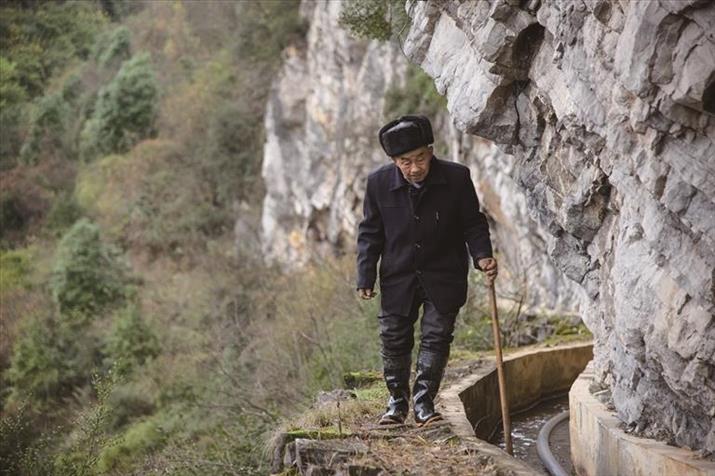|
||||||||||
| Home Nation World Business Opinion Lifestyle ChinAfrica Multimedia Columnists Documents Special Reports |
|
||||||||||
| Home Nation World Business Opinion Lifestyle ChinAfrica Multimedia Columnists Documents Special Reports |
| The CPC Leading to Prosperity |
| The Story of a Modern-Time Yugong |
| Echoing an ancient tale, a Chinese man "moves mountains" to transform the life of his fellow villagers |
| By Lu Anqi ·2017-08-01 |

In the rich treasure house of ancient Chinese fables, the story of the foolish old man who wanted to move mountains is without doubt one of the most popular and well-known in China.
In the story, an old man known as Yugong decided to remove two huge mountains in front of his house with his own hands and perhaps a spade or two. Do keep in mind that the story was written during the period from about the eighth century B.C. to the third century B.C., when there was not a single piece of modern equipment or tool available for him.
He set about this seemingly impossible task, believing that the job would be done one day at the continued efforts of his sons, grandsons, great grandsons, etc. The old man's deed moved the god who finally had the two mountains removed.
Millenniums later, a man living in a mountainous area of southwest China echoes Yugong's resolve. Huang Dafa led his villagers using hoes, steel chisels and hammers in digging a 9,400-meter-long canal across the high and precipitous mountains cutting off his home from the water resources.
It was a continuous unremitting endeavor which lasted for more than three decades. The opening of the canal has brought a long-awaited end to problems of water scarcity in three villages. Because of his unyielding resolve in building this lifeline canal, Huang has been dubbed as a "modern-time Yugong."
Decades of failure
Success does not come easily. Huang and his villagers have also experienced many failures.
Huang was born in 1935 in Caowangba, a mountainous village in southwest China's Guizhou Province with no electricity or roads. And worst of all, it lacked water for irrigation. Maize and potatoes were all that could be grown. Because of poverty, no women were willing to marry the men in the village.
Huang was elected as the village head in 1959 when he was only 23. Since then, he has been determined to achieve three things for his village: securing access to water, building roads and connecting it to the electricity grid.
He knew that rich water resources were located in another village a few kilometers away. But the only way to divert water to Caowangba was to cut through the mountains separating the two villages.
Huang - who had never gone to school - had neither the technology nor modern tools and equipment to build a canal. He used bamboo poles to help take measurements, and applied mud when cement was unavailable. When there was no hoisting equipment, he fastened himself to a straw rope to go up and down the cliff to chisel.
He worked like this on the canal for more than 10 years, but failed to divert water into his home village. Disappointed but not disheartened, he had to put down the work.
A promise well kept
Huang started to study canal building and irrigation technology. More than 10 years had passed before Huang decided to pick up his project again.
Following a professional survey and mapping, and with an elaborate plan and financial support from the county and township governments, then 57-year-old Huang led more than 200 villagers in launching another assault against the mountain in 1992.
As there were no roads, cement and stone powder had to be carried deep in the mountain by horse or on human back. Workers could only have two simple meals a day and worked relentlessly, even on Spring Festival, Chinese New Year's Day.
After three years' hard work, in mid-1995 Huang and his people completed the building of the 9,400-meter-long canal zigzagging on the precipitous cliffs. Thirty-six years had passed since Huang had become the village head and made the promise to build the canal.
Power and roads
Now with an irrigation system, Huang led the villagers to reclaim land from the mountain and develop it into terraced fields that could grow rice, walnut, grapefruit and hot pepper.
In the same year the canal was built, the village was also connected with the electricity grid and a road leading to the village was completed.
By the end of 2016, the per capita income in the village had exceeded 6,500 yuan (about $956).
With access to water, electricity and roads, villagers now lead a better life than before, but still have not got rid of poverty. Huang, now in his 80's, is thinking how he and his villagers can win their next battle against poverty.
| About Us | Contact Us | Advertise with Us | Subscribe |
| Copyright Beijing Review All rights reserved 京ICP备08005356号-5 京公网安备110102005860号 |